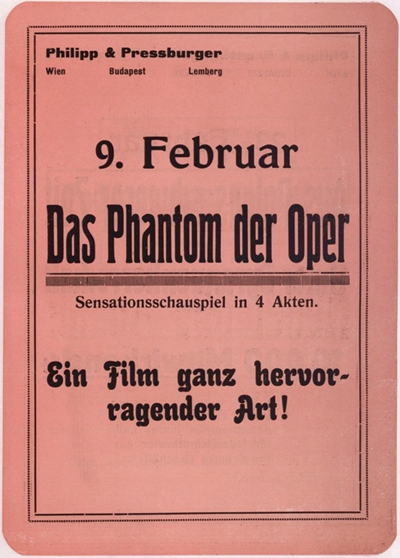Das Phantom der Oper (lost "The Phantom of the Opera" first-adaptation silent film; 1916): Difference between revisions
No edit summary |
|||
| Line 2: | Line 2: | ||
|title=<center>The Phantom of the Opera (1916)</center> | |title=<center>The Phantom of the Opera (1916)</center> | ||
|image=Phantom Af.jpg | |image=Phantom Af.jpg | ||
|imagecaption=Vintage Austrian | |imagecaption=Vintage Austrian trade ad. | ||
|status=<span style="color:red;">'''Lost'''</span> | |status=<span style="color:red;">'''Lost'''</span> | ||
}} | }} | ||
''' | '''Das Phantom der Oper''' (''The Phantom Of The Opera''), released in 1916, is considered to be the first movie adaptation of the famous Gaston Leroux novel of the same name. | ||
Made in Austria in 1916, the film was written and directed by Ernst Matray and starred Nils Olaf Chrisander as the Phantom and Aud Egede-Nissen as Christine.<ref>[http://monsterkidclassichorrorforum.yuku.com/topic/2297/Phantom-of-the-Opera-1916-question#.VXermflVgSW Forum section containing information about the film.] Retrieved 9 Jun '15</ref> | |||
The film was shown throughout Austria and the Netherlands from 1916 and 1917. It was then most likely returned to the studio where it was either misplaced or destroyed. No stills or | ==Premise== | ||
This adaptation, judging by vintage accounts, is relatively close to Leroux's version, including scenes where the Phantom coerces Christine to marry him. | |||
The film does differ somewhat in some respects in relation to the finale. The water trap Raoul is placed into is replaced by a small room that heats up like a furnace. In another deviation, unlike the novel, Christine does not accept the Phantom's love. Instead, Raoul and his male companion find a small opening in the trap room, find Christine, and flee together. The boiler to the trap overheats and explodes, killing Erik in the blast, which differs from his much more peaceful death in the novel. | |||
==Legacy== | |||
The film was shown throughout Austria and the Netherlands from 1916 and 1917. It was then most likely returned to the studio where it was either misplaced or destroyed. | |||
No stills, footage or even official imagery from the film have resurfaced. | |||
==References== | ==References== | ||
Revision as of 02:35, 10 March 2017
Das Phantom der Oper (The Phantom Of The Opera), released in 1916, is considered to be the first movie adaptation of the famous Gaston Leroux novel of the same name.
Made in Austria in 1916, the film was written and directed by Ernst Matray and starred Nils Olaf Chrisander as the Phantom and Aud Egede-Nissen as Christine.[1]
Premise
This adaptation, judging by vintage accounts, is relatively close to Leroux's version, including scenes where the Phantom coerces Christine to marry him.
The film does differ somewhat in some respects in relation to the finale. The water trap Raoul is placed into is replaced by a small room that heats up like a furnace. In another deviation, unlike the novel, Christine does not accept the Phantom's love. Instead, Raoul and his male companion find a small opening in the trap room, find Christine, and flee together. The boiler to the trap overheats and explodes, killing Erik in the blast, which differs from his much more peaceful death in the novel.
Legacy
The film was shown throughout Austria and the Netherlands from 1916 and 1917. It was then most likely returned to the studio where it was either misplaced or destroyed.
No stills, footage or even official imagery from the film have resurfaced.
References
- ↑ Forum section containing information about the film. Retrieved 9 Jun '15
